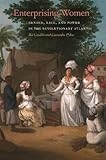Enterprising Women : Gender, Race, and Power in the Revolutionary Atlantic.
Material type: TextSeries: Race in the Atlantic World, 1700-1900Publisher: Athens : University of Georgia Press, 2015Copyright date: ©2014Description: 1 online resource (199 pages)Content type: text Media type: computer Carrier type: online resourceISBN: 9780820347790Subject(s): Businesswomen -- Caribbean Area -- History -- 19th century | Racially mixed women -- Caribbean Area -- History -- 19th century | Social stratification -- Caribbean Area -- History -- 18th century | Women, Black -- Caribbean Area -- History -- 19th centuryGenre/Form: Electronic books.Additional physical formats: Print version:: Enterprising Women : Gender, Race, and Power in the Revolutionary AtlanticDDC classification: 305.40896/9729 LOC classification: HQ1501 -- .C363 2015ebOnline resources: Click to View
TextSeries: Race in the Atlantic World, 1700-1900Publisher: Athens : University of Georgia Press, 2015Copyright date: ©2014Description: 1 online resource (199 pages)Content type: text Media type: computer Carrier type: online resourceISBN: 9780820347790Subject(s): Businesswomen -- Caribbean Area -- History -- 19th century | Racially mixed women -- Caribbean Area -- History -- 19th century | Social stratification -- Caribbean Area -- History -- 18th century | Women, Black -- Caribbean Area -- History -- 19th centuryGenre/Form: Electronic books.Additional physical formats: Print version:: Enterprising Women : Gender, Race, and Power in the Revolutionary AtlanticDDC classification: 305.40896/9729 LOC classification: HQ1501 -- .C363 2015ebOnline resources: Click to View Cover Page -- Title Page -- Copyright Page -- Contents -- Acknowledgments -- Introduction. Elisabeth and Her Sisters -- Chapter One. The Free Colored Moment -- Chapter Two. Bars, Brothels, and Business -- Chapter Three. By Labors and Fidelity -- Chapter Four. A Lasting Testament of Gratitude -- Chapter Five. The Queen of Demerara -- Chapter Six. By Habit and Repute -- Chapter Seven. Uncertain Prospects -- Conclusion -- Notes -- Bibliography -- Index.
In the Caribbean colony of Grenada in 1797, Dorothy Thomas signed the manumission documents for her elderly slave Betty. Thomas owned dozens of slaves and was well on her way to amassing the fortune that would make her the richest black resident in the nearby colony of Demerara. What made the transaction notable was that Betty was Dorothy Thomas's mother and that fifteen years earlier Dorothy had purchased her own freedom and that of her children. Although she was just one remove from bondage, Dorothy Thomas managed to become so rich and powerful that she was known as the Queen of Demerara. Dorothy Thomas's story is but one of the remarkable acounts of pluck and courage recovered in Enterprising Women . As the microbiographies in this book reveal, free women of color in Britain's Caribbean colonies were not merely the dependent concubines of the white male elite, as is commonly assumed. In the capricious world of the slave colonies during the age of revolutions, some of them were able to rise to dizzying heights of success. These highly entrepreneurial women exercised remarkable mobility and developed extensive commercial and kinship connections in the metropolitan heart of empire while raising well-educated children who were able to penetrate deep into British life.
Description based on publisher supplied metadata and other sources.
Electronic reproduction. Ann Arbor, Michigan : ProQuest Ebook Central, 2018. Available via World Wide Web. Access may be limited to ProQuest Ebook Central affiliated libraries.

There are no comments on this title.